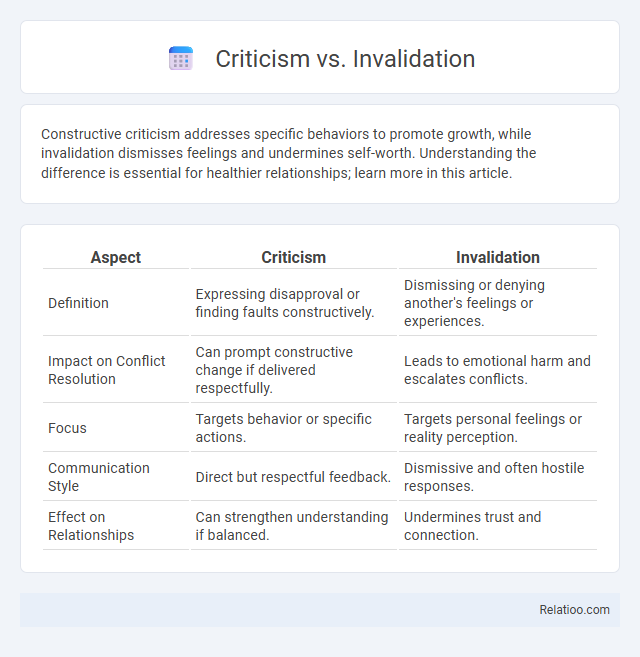Constructive criticism addresses specific behaviors to promote growth, while invalidation dismisses feelings and undermines self-worth. Understanding the difference is essential for healthier relationships; learn more in this article.
Table of Comparison
| Aspect | Criticism | Invalidation |
|---|---|---|
| Definition | Expressing disapproval or finding faults constructively. | Dismissing or denying another's feelings or experiences. |
| Impact on Conflict Resolution | Can prompt constructive change if delivered respectfully. | Leads to emotional harm and escalates conflicts. |
| Focus | Targets behavior or specific actions. | Targets personal feelings or reality perception. |
| Communication Style | Direct but respectful feedback. | Dismissive and often hostile responses. |
| Effect on Relationships | Can strengthen understanding if balanced. | Undermines trust and connection. |
Understanding Criticism: Definition and Purpose
Criticism involves offering constructive feedback aimed at improving a person's behavior or work, distinct from invalidation which dismisses or denies their feelings or experiences. Understanding criticism requires recognizing its role as a tool for growth, not as a personal attack. Effective criticism is specific, clear, and intended to foster positive change without undermining self-worth.
What Is Invalidation? Key Concepts Explained
Invalidation occurs when someone's feelings, thoughts, or experiences are dismissed or negated, often leading to emotional harm and eroding self-esteem. Unlike constructive criticism, which aims to provide helpful feedback, invalidation denies the legitimacy of Your emotions or perspective, making you feel misunderstood or ignored. Understanding invalidation is key to fostering healthier communication and validating interactions in personal and professional relationships.
Criticism vs Invalidation: Core Differences
Criticism involves providing feedback that evaluates and suggests improvements, often addressing specific behaviors or ideas, while invalidation dismisses or rejects someone's feelings or experiences, undermining their perspective. The core difference lies in intent: criticism aims to foster growth or change, whereas invalidation harms self-esteem by negating personal reality. Understanding these distinctions is essential in communication and psychology to promote constructive dialogue and emotional well-being.
The Role of Intent: Growth or Suppression
Criticism aims to provide constructive feedback with the intent to foster growth and improvement, while invalidation dismisses or negates your feelings or experiences, often leading to emotional suppression. The role of intent distinguishes these interactions; criticism nurtures development by highlighting areas for change, whereas invalidation suppresses expression and can harm self-esteem. Understanding this difference allows you to recognize when feedback is meant to support your progress or when it undermines your confidence.
Psychological Impact: How Each Affects Self-Esteem
Criticism, when constructive, can promote growth by highlighting areas for improvement, but harsh or frequent criticism may lower your self-esteem by focusing on faults. Invalidation dismisses your feelings or experiences, often leading to confusion, self-doubt, and a diminished sense of self-worth. Invalidation, especially when persistent, undermines your psychological well-being by making your emotions feel illegitimate, exacerbating anxiety and depressive symptoms.
Language and Tone: Subtle Signs to Watch For
Criticism often uses constructive language aimed at improvement, while invalidation employs dismissive or belittling tones that undermine feelings or experiences. Subtle signs of invalidation include sarcasm, minimizing phrases like "You're overreacting," or tone shifts that convey impatience or condescension. Distinguishing these differences in language and tone is crucial for recognizing emotional harm and improving communication dynamics.
Constructive Criticism: Fostering Improvement
Constructive criticism emphasizes specific, actionable feedback aimed at fostering improvement and personal growth, distinguishing it from mere criticism that may be vague or negative and invalidation that dismisses feelings or ideas entirely. It promotes a positive dialogue by acknowledging strengths while addressing weaknesses, encouraging development without attacking character. Effective constructive criticism enhances motivation and learning, creating an environment where individuals feel supported in making meaningful changes.
Invalidation in Relationships: Common Scenarios
Invalidation in relationships occurs when your feelings or experiences are dismissed, ignored, or minimized by a partner, leading to emotional disconnection and reduced trust. Common scenarios include one partner denying the other's emotions, trivializing concerns, or responding with sarcasm or contempt instead of empathy. Recognizing and addressing invalidation is crucial for maintaining healthy communication and emotional intimacy.
Responding Effectively: Setting Healthy Boundaries
Criticism involves offering constructive feedback aimed at improvement, while invalidation dismisses or undermines your feelings and experiences, causing emotional harm. Responding effectively requires recognizing these differences and setting healthy boundaries by calmly asserting your perspective and refusing to accept disrespect. Establishing clear limits protects your emotional well-being and fosters better communication in personal and professional relationships.
Cultivating Supportive Communication Skills
Criticism involves offering constructive feedback aimed at improvement, while invalidation dismisses or denies someone's feelings or experiences, harming trust and connection. Cultivating supportive communication skills requires recognizing the impact of words, practicing empathy, and responding with validation to foster understanding and emotional safety. Emphasizing active listening and compassionate dialogue helps transform criticism into growth opportunities without triggering defensiveness or disengagement.

Infographic: Criticism vs Invalidation
 relatioo.com
relatioo.com